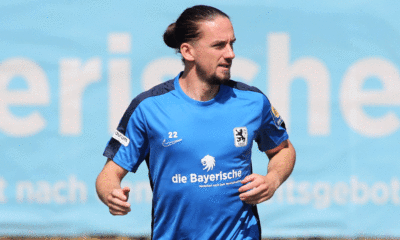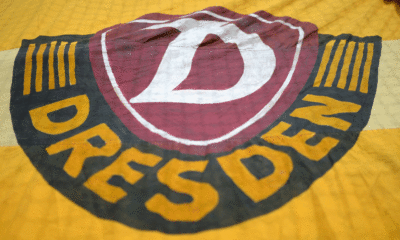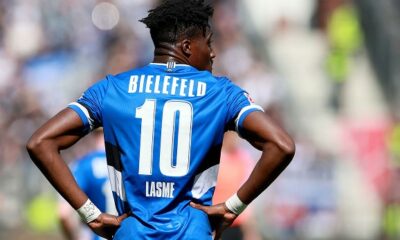Bundesliga
Interview with Marius Wolf from Borussia Dortmund: “It was said that I should rather start an apprenticeship”
Published
2 years agoon
By
Maria Keane
Marius Wolf has been awarded twice since moving to Borussia Dortmund in 2018. In the third attempt at BVB, the 26-year-old has now established himself as a polyvalent role player in the squad.
In an interview with SPOX and GOAL, Wolf talks about his career so far and looks back on his exit from the youth team at 1. FC Nürnberg and his subsequent happiness at TSV 1860 Munich.
Wolf also comments on the demotion at Hannover 96, the Eintracht Frankfurt standard that hovers above him, and explains why he reacts positively to creative criticism on Twitter.
Mr. Wolf, you come from near Coburg and often went skiing as a child. You joined your first football club, VfB Einberg, at the age of three. Did skiing never stand a chance against football?
Marius Wolf: No, skiing was definitely an option. I also drove for a long time after I started playing football. But in the end I probably just missed the mountains to be able to really intensify it. There aren’t that many around Coburg. Unfortunately, I no longer drive at all, if only because of the risk of injury. I claim I’m still good enough at it, but if someone bumps into me, I’ve got the same salad.
It should be a childhood dream of yours to go skiing in the USA.
Wolf: Yes. The dream still exists and I will fulfill it very soon after my career. I’ve always wanted to do that with my buddies. I can’t say exactly where that will be, but it should be a small, nice and snow-covered place.
In the end, football won out. When you were eleven you played in your home town of Rödental, but from 2006 you also played in a German-Czech football school. How did you get into it?
Wolf: I don’t remember exactly how I got in there. This was a project in which German and Czech children played football together, exchanged ideas and came into contact with the other language. We trained twice a week, alternately in Hof and in the Czech Republic, not far from the border. There were also really cool trips taken. Once we flew to Liverpool to play Everton. In Prague and Warsaw we took part in prominent youth tournaments. Basically, we often played against youth teams from professional clubs. It was a suitable place for me to be able to play at a higher level.
How is your Czech today?
Wolf: I picked up quite a few things in that one year, but it was better once. (laughs)
You also scored two goals for this team in a game against 1. FC Nürnberg, which ultimately earned you a trial at the club and, from January 2008, a place at the youth academy there. There you played from the U13 to the U17 Bundesliga – and were then retired in 2012 because you were said to be too small and slow. Was that the only reason?
Wolf: The physical component was the main reason. I was still one of the youngest in the U17s. My leap in development in this regard came a little later than with others, and it wasn’t just me that felt that way.
Did you have any premonition that the verdict would be against you?
Wolf: In the youth field, such talks took place every year after the end of the season. So theoretically I could already guess something along those lines, but of course you don’t really want to admit it at that age and quickly suppress it. It was then said that it was not enough for me to become a professional. I should look elsewhere and maybe start an apprenticeship instead. I had just turned 17, which was quite a blow.
You then moved to the NLZ von 1860 Munich, where Wolfgang Schellenberg had just become the new manager. Schellenberg previously worked at the club, he remembered you. Have you ever thought about what would have happened to you if things hadn’t gone that way?
Wolf: There are many what-if situations like this in life. Sometimes you just have to be lucky and in contrast to Nuremberg I had it in this case. I initially trained in Ingolstadt, but somehow that wasn’t for me and, to be honest, it wasn’t at the level I was used to in Nuremberg. Suddenly I got in touch with Wolfgang, who simply asked me if I would like to come to 1860. That was the jackpot for me at that moment. The reputation of youth work at the lions is well known, I could never have said no to this overall package. Wolfgang became my sponsor, he took great care of me and made many things easier for me. I am really very grateful to him.
Although you weren’t physically that far back then, you were promoted at 1860 in the same way as Julian Weigl and Florian Neuhaus, who showed a similar physical deficit. But that doesn’t happen in every NLZ. In your opinion, is it a problem that there is often no patience with the players’ leaps in development?
Wolf: Absolutely. I quickly realized that the focus and approach at 1860 was completely different from Nuremberg. As an association, 1860 lived very differently from its youth work. If you’re one of the youngest at 14 and have to play against someone who’s almost 1.80 meters tall, then of course you don’t stand a chance in a duel – even if your footballing qualities are perhaps a lot higher than those of your opponent. The Lions looked much more closely at the individual players and not so much at the team performance. Training the individual was more important than just winning. And as a result, the team performance was automatically right.
You made your professional debut with the lions in 2014 at the age of 19. Two years later you left your Bavarian home for the first time and switched to Hannover 96. You were very unlucky there: in your first six months you played under Thomas Schaaf, but when Daniel Stendel took over in the summer of 2016 you were sent to the amateurs at the start of the season . You were also injured and then contracted glandular fever. How did that feel back then compared to that setback four years earlier in Nuremberg?
Wolf: At the club I processed it in a different way, I was still a child. I had fewer negative thoughts then. It was more like: everything will be fine. At 96, on the other hand, it was already starting to work in me. The club spent good money on me, had expectations, but then put me straight into the second team with the new coach without a real chance. At first I was devastated. For the first time I was completely alone in a strange city and had hardly any connection to other people. As a child you get to know friends faster, but as a professional you realize that you should pay more attention to who you trust and who you let get close to you. At that time I was sitting at home alone a lot and I was not doing well. My family gave me a lot of courage, so that in the end I quickly made the decision that there was simply no point in suddenly giving up.
Were there moments when you felt alone too soon and had to grow up too quickly overall?
Wolf: Clear. If you want to make it to the top in football, you have to grow up fast. That’s the system, there’s basically no other way. Of course, there are advantages and disadvantages to being self-employed so early on. I think a lot of my mistakes that I made alone and far from home would not have happened to me if my parents had been around me and kind of taken care of me. On the other hand, you don’t make the mistakes that other 26-year-olds make when you’re 26 because you made them when you were 18. (laughs)
Marius Wolf: The performance data of his professional career
| society | competitive matches | Gates | assists |
| TSV 1860 Munich (2014-2015) | 44 | 5 | 5 |
| Hanover 96 (2016-2017) | 2 | – | – |
| Eintracht Frankfurt (2017-2018) | 38 | 6 | 11 |
| Borussia Dortmund (since 2018) | 44 | 1 | – |
| Hertha BSC (2019-2020, loan) | 23 | 1 | 5 |
| 1. FC Cologne (2020-2021, Loan) | 35 | 2 | 3 |


Test match tournament on free TV and live stream
In preparation for the upcoming start of the season in the 2nd and 3rd divisions, SpVgg Unterhaching is organizing a...


Test match on free TV and live stream
Third division club Dynamo Dresden are testing today against top Czech club Slavia Prague in preparation for the upcoming start...


When does the season start?
It’s warm and sunny outside, but you just want to watch football again? Then get in the mood for the...

